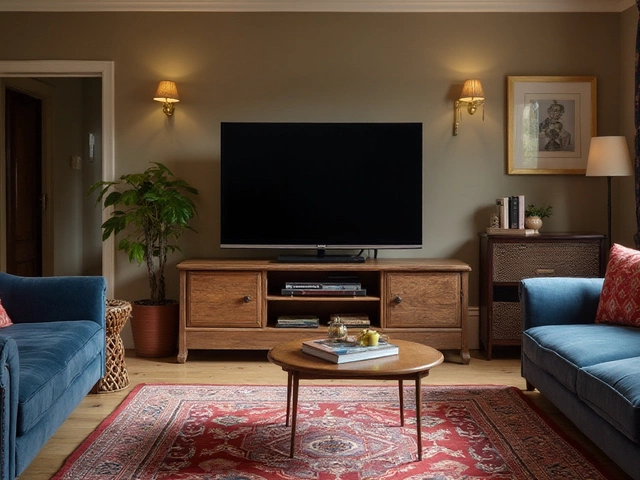So, you're thinking about catching your Z's in a recliner, huh? Funny as it may sound, it’s a legit question for more folks than you might imagine. There are actually some solid reasons why people trade in their beds for a recliner, at least on occasion. For starters, if you’re someone who battles with back pain or acid reflux, the angle of a recliner might just be your new best friend. Elevating your head and feet can help with circulation and reduce pressure, which is a big win for sleepers.
But hold on, it's not all sunshine and rainbows. Consider this before diving into a full-time relationship with your recliner: these cozy chairs might put you at risk of developing aches or even bad posture if you plant yourself in them night after night. You gotta be smart about it.
And it’s not just about throwing a pillow behind your head and calling it a day. Those who really make this work know a trick or two about setting up their space for ultimate chill—like using extra pillows and making sure their feet have plenty of room. It’s all about finding that sweet spot where comfort meets support.
- Benefits of Sleeping in a Recliner
- Potential Downsides to Consider
- Who Benefits Most from Reclined Sleeping?
- Tips for Comfortable Recliner Sleep
- Common Concerns and Myths
Benefits of Sleeping in a Recliner
Ever considered ditching your bed for a recliner chair instead? Turns out, sleeping in a recliner has its perks, especially if you're chasing comfort or relief from some pesky conditions.
First off, if you've got back pain, a recliner set at just the right angle can do wonders by reducing pressure on your spine. Meanwhile, folks dealing with acid reflux or GERD might find that sleeping in a reclined position helps keep stomach acid from rising. That slight elevation of your upper body is like having gravity as your sleep buddy.
Then there’s the magic it does for snoring. If you or your partner sounds like a tractor at night, a recliner might just hush those snores by opening up your airways. Sure makes getting a good night’s sleep a little easier!
And you're not just limited to sleeping in the same way. Say goodbye to restless legs or swelling because a recliner allows you to elevate your legs, helping blood circulation flow smoothly. This is especially handy after long, standing-up sort of days.
For people with sleep apnea, a reclined sleep position may also provide some relief. By keeping the head elevated, it might ease breathing and give you more stable and restful sleep.
Let’s not overlook comfort. Ever just want to curl up in front of your favorite show and drift off? Recliners make that super easy, blending relaxation and support. You wake up right where you parked—a win-win.
Potential Downsides to Consider
Now let's talk about the flip side of cozying up in a recliner each night. While it might sound like a slice of heaven, there are a few things you really need to keep an eye on.
First, even if these chairs seem super comfortable, they’re not designed for long-term sleep. Spending too many nights in a row in a recliner can mess with your posture. Most recliners don’t provide the same back support as a mattress. You might find yourself waking up with more aches and pains over time – not exactly the recipe for sweet dreams.
Speaking of body alignment, the reclined position, while great for easing certain issues like snoring, might not be the best for everyone. If you're used to sleeping on your stomach, for example, getting comfortable in a recliner could be quite the challenge. And since most recliners keep you somewhat upright, it might put pressure on your hips and lower back, especially if you don’t switch up your position throughout the night.
Then, there's the question of circulation. Some people report feeling a bit numb or tingly in their legs after a night in the chair. This could happen because when you're reclined but not fully flat, blood flow might not be as efficient, especially if your legs hang off the end uninhibited.
And hey, even if you're loving the idea of switching things up, remember that not all recliner chairs are created equal. Be extra selective if you're shopping around. Make sure it’s one that reclines fully and offers good leg support. You might even look for those with added features like adjustable headrests or lumbar support.

Who Benefits Most from Reclined Sleeping?
Ever wonder who might actually get more out of snoozing in a recliner than in a regular bed? Well, it's not just those spontaneous nappers or people too cozy to move back to a bed. There are a couple of groups who might seriously benefit from making this a nightly habit.
First on the list are folks dealing with back pain. If you're one of them, you might find that a recliner offers better support, spreading out pressure more evenly across your body. This can sometimes even relieve spine stress, which a flat bed might worsen. But remember, not all back pain is the same, so what works for one might not work for another.
Then there are those battling with acid reflux. Sleeping in a slightly upright position can help keep stomach acids where they belong, reducing that burning sensation and discomfort.
People with snoring or mild sleep apnea might also find relief. The upright angle helps to keep airways more open compared to lying flat, which can lower that gasping or snoring.
The elderly often find recliners more comfortable due to easier transitions between sitting and standing and less strain on the joints, especially hips and knees. Plus, swelling in the legs or feet can sometimes be reduced by elevating them—a big win in the comfort department.
| Condition | Potential Benefits |
|---|---|
| Back Pain | More even pressure distribution, less stress on spine |
| Acid Reflux | Reduces acid traveling upward by maintaining an upright position |
| Snoring/Sleep Apnea | Improves airflow by keeping airways open |
| Joint Pain in Elderly | Eases transitions, reduces strain on joints |
Keep in mind, though, sleeping in a recliner chair isn't for everyone. If not done right, it could actually end up being more uncomfortable, so experimenting and finding what feels good to your body is key.
Tips for Comfortable Recliner Sleep
Okay, so you're seriously considering swapping your bed for a recliner chair at night, or maybe you already have. The key to making this work is all about setting things up right to ensure quality sleep.
First off, you're gonna want the right support. Start with a nifty pillow for your neck. Most recliners don't cradle your neck quite like a good mattress and pillow combo can. But a supportive neck pillow can do wonders. Look for something memory foam-based to keep things comfy.
Your back needs some love too. A lumbar support pillow can help maintain the natural curve of your spine while you snooze. Stick this right in the small of your back for some added comfort.
If your reclined sleeping journey leaves you with chilly toes or pins and needles, it might be time to up your leg game. Throw some cushions under your knees to improve circulation and keep your legs happy through the night.
- Select the right blanket: You want something breathable. Recliners can trap heat, so avoid heavy fabrics that might make you sweat.
- Adjust the recline: Not too upright, but not too flat either. Adjust to find the sweet spot where your whole body feels supported.
- Keep essentials nearby: A small side table or organizer can keep water, books, or reading glasses at your fingertips, making your setup even more inviting.
Now, let's talk recliner features. If yours can rock or swivel, make sure you've locked it in place before you catch some shut-eye. You want stability more than anything when you're sleeping in a recliner.
Remember, the goal here is to create a sleep-friendly environment that works for you. Follow these steps, and you might just find your recliner turning into the sleeping haven you never knew you needed.

Common Concerns and Myths
There’s a lot of buzz about whether sleeping in recliner chairs every night is a good idea, and with it comes a mixed bag of myths and genuine concerns. Let's break them down:
Myth 1: You'll Get Stuck—No, you won’t glue yourself permanently to your recliner. It's a fear that if you spend too much time reclined, you might become the chair! In reality, unless there’s a mechanical failure or the world's laziest cat on your lap, you’re free to move as you please.
Concern 1: Poor Circulation—Some folks worry that regular recliner use might mess with circulation, especially if you're a night owl in these seats. To prevent this, make sure your feet are supported and your legs aren't dangling. Keeping them slightly elevated can help maintain healthy blood flow.
Myth 2: Bad for the Spine—Sure, lounge in a terribly made recliner and your back might protest, but a well-crafted recliner can actually support spine alignment. If you’re looking to make it a permanent sleep spot, grab one with good lumbar support.
Concern 2: You’ll Miss the Bed—The nostalgia of a big, comfy bed is real. While a recliner can be incredibly comfortable, some folks miss the space a bed offers. Consider using the recliner as a temporary solution or a complement to your bed routine.
Now, let's clear up some stats and help settle the debate:
| Common Concern | Reality Check |
|---|---|
| Joint Stiffness | Adequate motion keeps joints limber. Shift positions to stay comfy. |
| Claustrophobia | Recliners come in various sizes—don't choose one that feels like a hug from a bear if that's not your thing. |
Next time someone gives you the side-eye for snoozing in a recliner, you’ll have the facts ready to put their mind at ease—or at least strike up an interesting debate!



